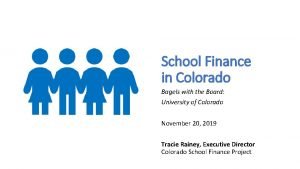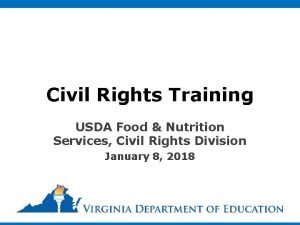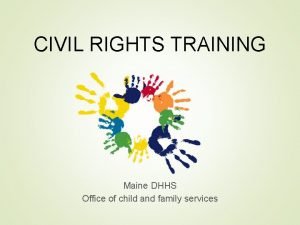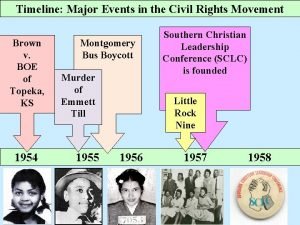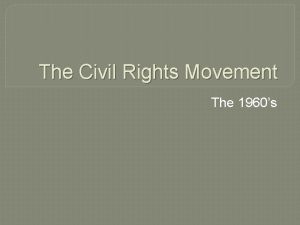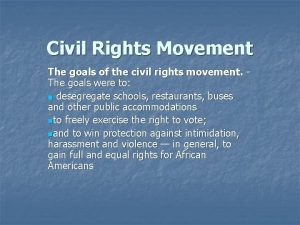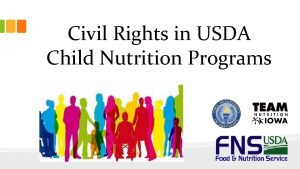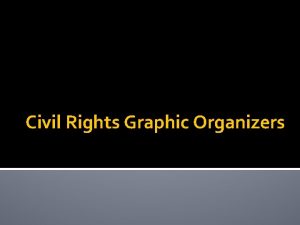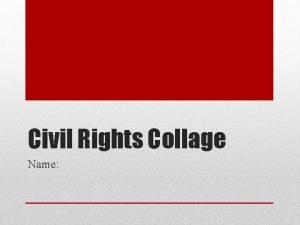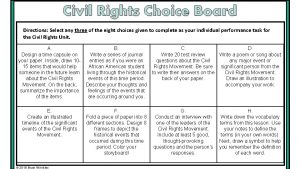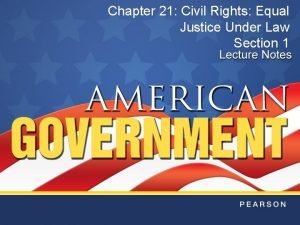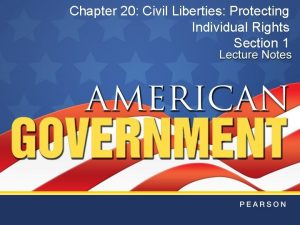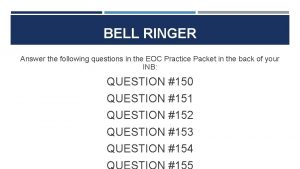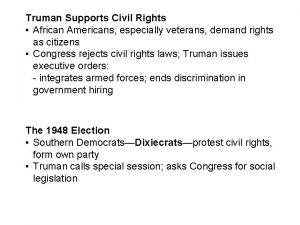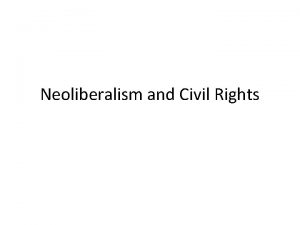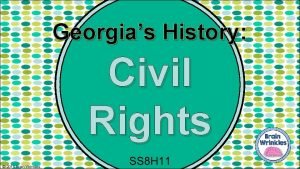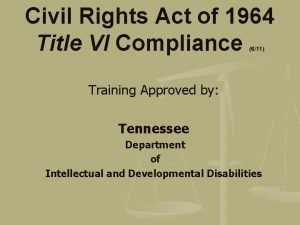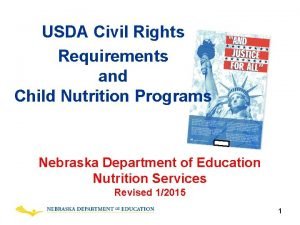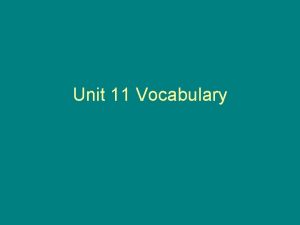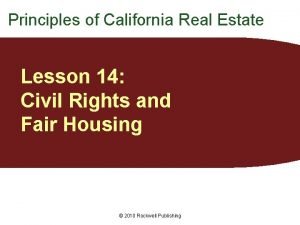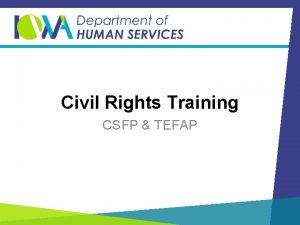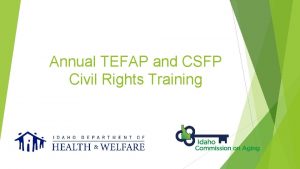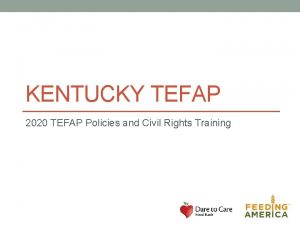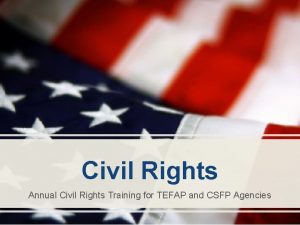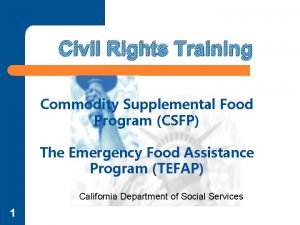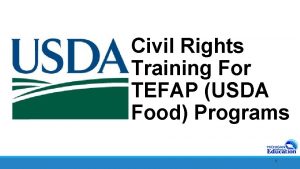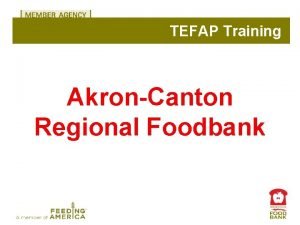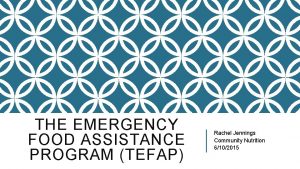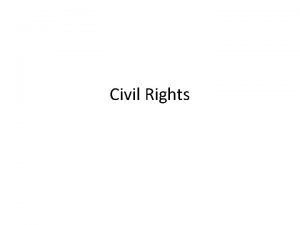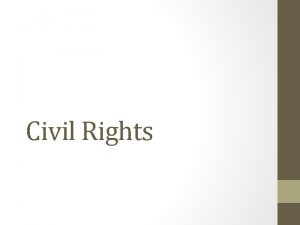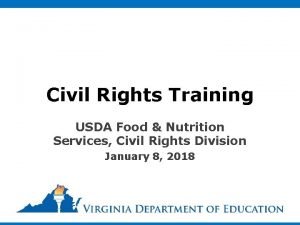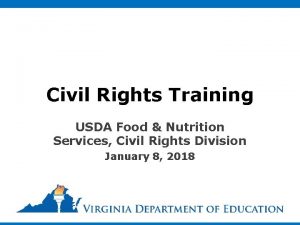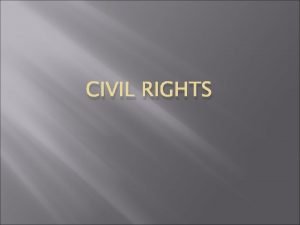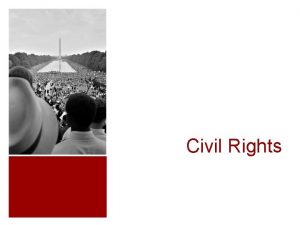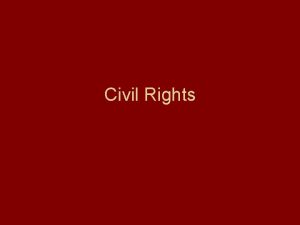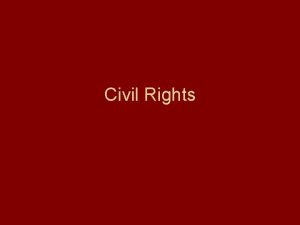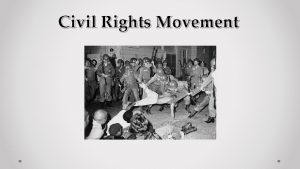Civil Rights Training CSFP TEFAP Civil Rights Food





























- Slides: 29

Civil Rights Training CSFP & TEFAP

Civil Rights & Food Distribution • Civil Rights are the non-political rights of a citizen and are guaranteed by the 13 th and 14 th Amendments of the U. S. Constitution and Acts of Congress. • Organizations that accept Federal financial assistance must obey Federal civil rights laws, regulations, instructions, and guidance. USDA foods are considered Federal financial assistance per Civil Rights Instruction 113 -1. • Organizations that receive USDA foods must demonstrate civil rights compliance. This includes annual training for any person working with recipients of TEFAP and/or CSFP food. • Civil rights laws, regulations, executive orders, and related other guidance can be found on this website: http: //www. fns. usda. gov/cr/crregulation. htm Month 01, 2018 2

Goals of Civil Rights Training • To provide equal treatment for all applicants and program recipients. • To provide clients with knowledge of their rights and responsibilities as a program recipient. • To eliminate barriers that prevent or deter people from receiving benefits. • To promote dignity and respect for everyone. • All front-line workers, including volunteers and supervisors, must receive annual civil rights training. 3

Annual Training • Knowledge of civil rights applies to most areas of food distribution programs. • All employees and volunteers who work directly with program applicants and/or recipients (and their supervisors) need to be aware of civil rights requirements. • Training must be documented annually. 4

The following policies prohibit discrimination based on race, color, national origin, age, sex, & disability. Civil Rights Laws Protected Classes Title VI – Civil Rights Act of 1964 Civil Rights Restoration Act of 1987 ü Race/Language ü Color ü National Origin Age Discrimination Act of 1975 ü Age Title IX of the Education Amendments of 1972 ü Gender Section 504 of the Rehabilitation Act of 1973 Americans with Disabilities Act ü Disability Title VII CFR 16. 3, Responsibilities of Participation Organizations ü Religion Title VII CFR 247 (CSFP), 250 (Food Distribution), & 251 (TEFAP) FNS Instruction 113 -1 ü All Classes All documents are available at http: //www. fns. usda. gov/cr/crregulation. htm 5

Types of Discrimination • Disparate Treatment is when a person is intentionally discriminated against as a member of a protected class. – Example: Members of religious groups are denied service because their beliefs do not match the religious teachings of the organization that is distributing food. • Disparate Impact is when actions that appear neutral have a negative impact on a protected class. – Example: A distribution site makes the Russian clients wait until the end of the day for food because interpreters are not available until late afternoon. This creates a situation where coveted food items may be unavailable to a specific group. • Retaliation is the negative treatment of a member of a protected class in response to previous civil rights activity. This includes actions against their family and/or their associates. – Example: Family and friends of a client are denied food after the client filed a complaint against the agency. 6

Eligibility Requirements vs Discrimination • Congress has the ability to establish programs that are intended for certain groups of people such as CSFP that serves only persons 60 years of age and older. • It is not considered discrimination to exclude those who do not meet eligibility requirements for these types of programs. • For example, Congress can set age limits and this is not age discrimination for those who do not meet the age limits. 7

Components of Civil Rights Training In accordance with FNS Instruction 113 -1, civil rights training must include, but not be limited to: • Collection & use of data • Effective Public Notification Systems • Complaint Procedures • Compliance Reviews • Resolution of Non-compliance • Reasonable Accommodation of people with disabilities • Language Assistance • Conflict Resolution • Customer Service 8

Collection and Use of Data • CSFP regulations require annual reporting of client’s racial and ethnic data. (FNS-191 Report) • Applicants self-declare racial/ethnic data (CSFP). • If an applicant refuses to provide racial/ethnic data, they are to be advised that the information will be collected based on your observation (CSFP). • Outreach efforts can be targeted to groups not adequately represented in program participation. • Maintain all records for three years plus the current fiscal year. • All data collected must be kept secure and confidential. 9

Public Notification • There are civil rights requirements for notifying the public about TEFAP and CSFP. – All materials, including websites, must contain the USDA nondiscrimination statement. – Convey a message of equal opportunity through photos and graphics in USDA program-related information. – Information should be provided in different formats and languages to meet all levels of ability. – Special efforts should be made to reach under-served groups who may qualify for services using appropriate media. 10

Nondiscrimination Statement • The “USDA Non-Discrimination Statement” must be included on all materials that mention USDA programs (i. e. , TEFAP, CSFP, commodities). • The statement provides contact information for anyone to file a complaint of discrimination directly with the USDA. • There is a full version and a short version of the nondiscrimination statement. • Font size for the full version may be smaller than the rest of the publication, but it must be readable. • The full version is available on page 2 of the FNS website: https: //www. fns. usda. gov/fns-nondiscrimination-statement 11

Long Version of the Nondiscrimination Statement In accordance with Federal civil rights law and U. S. Department of Agriculture (USDA) civil rights regulations and policies, the USDA, its Agencies, offices, and employees, and institutions participating in or administering USDA programs are prohibited from discriminating based on race, color, national origin, sex, disability, age, or reprisal or retaliation for prior civil rights activity in any program or activity conducted or funded by USDA. Persons with disabilities who require alternative means of communication for program information (e. g. Braille, large print, audiotape, American Sign Language, etc. ), should contact the Agency (State or local) where they applied for benefits. Individuals who are deaf, hard of hearing or have speech disabilities may contact USDA through the Federal Relay Service at (800) 877 -8339. Additionally, program information may be made available in languages other than English. To file a program complaint of discrimination, complete the USDA Program Discrimination Complaint Form, (AD-3027) found online at: https: //www. ascr. usda. gov/filing-discrimination-complaint-usda-customer, and at any USDA office, or write a letter addressed to USDA and provide in the letter all of the information requested in the form. To request a copy of the complaint form, call (866) 632 -9992. Submit your completed form or letter to USDA by: (1) mail: U. S. Department of Agriculture Office of the Assistant Secretary for Civil Rights 1400 Independence Avenue, SW Washington, D. C. 20250 -9410; (2) fax: (202) 690 -7442; or (3) email: program. intake@usda. gov. This institution is an equal opportunity provider. 12

Short Version of the Nondiscrimination Statement “This institution is an equal opportunity provider. ” • The short version may be used where the longer statement does not fit. • The short version must be in a font size no smaller than font size used in rest of publication. • The short version may not be used in place of the long statement on clients’ rights documents (such as an application). 13

“. . . And Justice for All” Poster • The poster must be prominently displayed where clients and applicants can see it. • This poster serves as a trademark indicating the site provides a USDA program without discrimination. • The poster has contact information so that anyone has information to file a discrimination complaint directly with the USDA. • Agencies can obtain free copies of this poster by contacting your partner food bank • Downloading and printing from the FNS Civil Rights website at http: //www. fns. usda. gov/cr/justice. htm. (The required print size is 11”x 17”) 14

The current “And Justice For All” Poster 15

Complaints • Everyone has the right to file a complaint of discrimination. • Every employee and volunteer must know what to do if someone wants to file a complaint. – What is your agency’s process? • If a complaint is elevated to the State or Federal office, the maximum time to process the complaint is 90 days. • Be aware of the basis for which complaints may be filed: – race, color, national origin, age, sex, disability, and retaliation. • Always attempt to resolve the complaint at the lowest level. • Never discourage someone from filing a complaint or voicing concerns of discrimination. 16

Compliance Reviews • State and Federal governments are required to conduct reviews to determine compliance with civil rights laws, regulations, and requirements • Cooperation with State and Federal reviewers is required as a condition of receiving Federal financial assistance (Remember, USDA food is considered financial assistance). • There are three types of reviews: – Pre-award: a review conducted before an agency starts distributing TEFAP and/or CSFP. – Post-award: in Iowa, this is part of your TEFAP/CSFP audit conducted by the State and your TEFAP partner food bank. – Special compliance review: a review conducted by USDA for significant civil rights concerns. 17

Resolution of Noncompliance • Corrective Actions may be assigned as a result of the review process. • Agencies are required to cease inappropriate actions and institute proper procedures. • Failure to comply with civil rights requirements can result in the loss of Federal assistance from all Federal sources. 18

Reasonable Accommodation for People with Disabilities • A reasonable accommodation is a change in rules, policies, practices, or services so that a person with a disability will have an equal opportunity to apply for and receive TEFAP and/or CSFP food. – The agency should do everything they can to assist a person with disabilities. – The agency is not required to make changes that would fundamentally alter the program or create an undue financial and administrative burden. • Proxy distribution must be allowed – Reasonable accommodations may be necessary at all stages of the process, including application, receipt of benefits, and client notification. 19

Limited English Proficiency • Limited English Proficiency (LEP): An LEP individual is a person who is unable to speak, read, write, or understand the English language at a level that permits him or her to interact effectively with health and social service agencies and providers. • Service must be provided, but there is some flexibility on methods used. • Volunteers may be used as interpreters and must maintain participant confidentiality. • Children should not be used as interpreters. • There is a potential for discrimination based on national origin when accommodations are not made for LEP individuals. • Visit www. lep. gov for more information. 20

Accommodations • Is your distribution site accessible? Consider the parking lot, entrances, exits, hallways, elevators, and restrooms. • Do you have access to sign language interpreters or interpreters for non. English languages? • Do you have signage and paperwork in Braille or in non-English languages? • Do you allow service animals in your facility? • Do you provide home delivery? 21

What is Reasonable • When do I have to translate TEFAP/CSFP applications into another language or place a ramp to gain entry to the building? • Consider the following factors to help make that decision. Keep in mind that shortage of resources does not eliminate meeting this requirement except in cases of extreme hardship. – What is the percentage of disabled/LEP persons being served? – What is the percentage of disabled/LEP persons in the eligible local population? – What is the frequency of disabled/LEP persons’ contact with program? – How vital is the service to the clients? – What are the agency’s available resources and cost of services? 22

Conflict Resolution • Treat others the way they want to be treated (or at least be aware of what that is). • Have a written and posted policy for dealing with unacceptable behavior and conflicts. • Remain calm. • Listen and really hear the other person. • Ask questions to gather information. • Be empathetic. • Explain situation (rules, expectations). • Get help, especially if threats or if violence is possible. 23

Customer Service • Treat everyone with dignity and respect and make people feel welcomed. • Be patient and polite. • Make sure that the clients receive equal treatment and service. – Equal does not mean identical. – For example, one participant receives corn, another receives green beans. • Do not do special favors for anyone that you are not prepared to provide for everyone. – Disabilities and language needs are not considered special favors since they are required. 24

Customer Service cont. • Smile • Know and be able to explain policy and rules that must be followed. • Don’t be afraid to apologize. • • Do not treat people differently based on race, color, national origin, age, sex, or disability. • Do not impose policies that unfairly impact certain groups. • Do not retaliate against anyone who files a complaint (or their family, friends or employees who cooperate with a civil right investigation). 25

Customer Service Final Thoughts In order to minimize the risk of a civil rights discrimination complaint, ask yourself the following questions each time an applicant and/or participant comes to your program: • Am I treating this person in the same manner as I treat others? • Have I clearly explained to this person what information I need to make a determination on the application? • Have I given this person the opportunity to clarify all relevant factors or inconsistencies? • Have I provided the person the information they need to make necessary decisions? • Am I treating this person as I would wish to be treated? 26

Equal Opportunity for Religious Organizations • USDA Regulations (7 CFR 16) require equal opportunity for Faith Based Organizations (FBO’s) and Community Based Organizations (CBO’s). • Discrimination is prohibited on the basis of religion or religious belief or character. • FBOs can use facilities for USDA food distribution without removing religious art or symbols. • Religious organizations may not use USDA funds or supplies to support worship, religious instruction, or proselytization (attempt to convert). • Religious schools can consider religion in admission practices and required curriculum. 27

Religious or Faith-Based Organizations TEFAP providers must: – Post written notice in a prominent place – Refer a participant to an alternate provider if available – Ensure the participant has no objection to the alternate provider Obtain the Written Notice and Referral letter from your food bank. 28

Civil Rights Final Steps • Be sure to sign a document indicating that you participated in Civil Rights training. • Talk to your food bank if you have questions about the information included in this presentation. • Thank you for completing your Civil Rights training. 29
 Casbo colorado
Casbo colorado Civil rights and civil liberties webquest
Civil rights and civil liberties webquest Usda civil rights training
Usda civil rights training Civil rights training child nutrition programs
Civil rights training child nutrition programs Federally protected classes
Federally protected classes Unit 2 food food food
Unit 2 food food food Eltonian pyramid
Eltonian pyramid Civil rights timeline of events
Civil rights timeline of events Civil rights sitins
Civil rights sitins Mother of the modern day civil rights movement
Mother of the modern day civil rights movement Postwar prosperity and civil rights
Postwar prosperity and civil rights Define civil rights
Define civil rights Civil rights movement jeopardy
Civil rights movement jeopardy Unit 7 modern ga and civil rights
Unit 7 modern ga and civil rights Civil rights movement goal
Civil rights movement goal Civil rights in child nutrition programs
Civil rights in child nutrition programs Civil rights graphic organizer
Civil rights graphic organizer Civil rights leaders collage
Civil rights leaders collage Civil rights choice board
Civil rights choice board Chapter 21 civil rights equal justice under law
Chapter 21 civil rights equal justice under law Chapter 20 civil liberties protecting individual rights
Chapter 20 civil liberties protecting individual rights Civil rights bell ringers
Civil rights bell ringers Truman supports civil rights
Truman supports civil rights Characteristics of civil rights
Characteristics of civil rights Civil rights cloze notes 1
Civil rights cloze notes 1 Civil rights cloze notes
Civil rights cloze notes Title vi of the civil rights act of 1964
Title vi of the civil rights act of 1964 Civil rights in child nutrition programs
Civil rights in child nutrition programs Civil rights movement vocabulary
Civil rights movement vocabulary Unruh civil rights act real estate
Unruh civil rights act real estate
